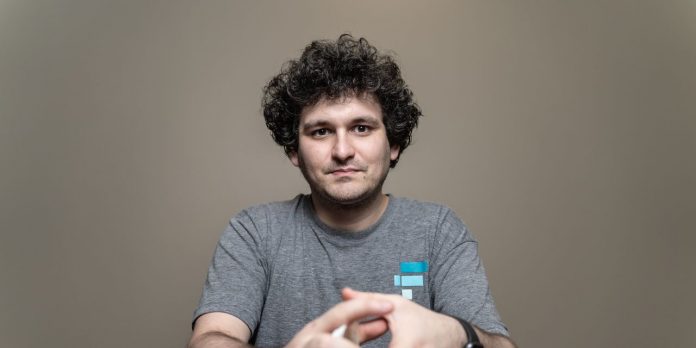I read recently of the antics of two American billionaires with a kind of horrified fascination. The first was Elon Musk, who seems to be morphing from “a brilliant visionary” (at least in the eyes of some) to a cartoon-like James Bond villain, who fires thousands of people without a second thought, and whose electric cars are charged by carbon-burning electrical plants. The other was Sam Bankman-Fried, head of the crypto trading platform FTX, whose empire now looks like nothing more than a vast Ponzi scheme designed to suck money form the gullible, the greedy and the desperate.

Sam Bankman-Fried
What struck me as I read about these men was not just the oddity of their very existence (why do we have billionaires, anyway?) but the surprising fact that both seem to have attracted legions of devoted fans: Musk, for supposedly leading us into a better future in which we will all be driving electric vehicles on Mars, and Bankman-Fried for his commitment to “effective altruism” (EA)—the idea that we should give our charitable donations in ways which will be “most effective.”
Effective altruism is, as the eponymous website puts it, “doing good better.” Effective altruists believe, among other things, that doing good is something that can be quantitatively measured (“some ways of doing good are over 100 times more effective than others”) and that “We can do a lot of good with our careers.” Interestingly enough, this does not mean that we should choose to be nurses or social workers or dentists or teachers, careers which have, as their very ethos, the goal of helping others; rather, it means that we should choose careers that make us rich, so that we will then have money which we can donate in “effective” ways.
Without exploring all the philosophical questions that are being begged here, I should note that there are some important philosophical ideas underpinning this perspective, most notably, perhaps, those advanced by Peter Singer, who is, as I used to tell my students, “an unrepentant utilitarian.”

Peter Singer
Utilitarians believe that the correct action in any given situation is the one that will produce the greatest amount of good for the greatest number of people. Like effective altruists, utilitarians, too, believe that good (and bad) are things that can be measured. While utilitarianism sounds good in theory, in practice, most ethicists believe that unconstrained utilitarianism can lead to astonishingly unethical conclusions. To give just one example: an argument could easily be made, on utilitarian grounds, that all residents of long-term care homes ought to be euthanized, with or without their consent, because they are using up resources that could be better spent elsewhere.
Most people would recoil from this conclusion. Singer, however, does not. While he has argued that we have equal moral obligations to people on the other side of the world as we do to those living close to us, and that we ought to take the rights of animals seriously, he has also made the case that we might have greater moral obligations to a healthy young dog than we do to a handicapped child: the first can live a good life, while the second cannot, so perhaps we should spend our resources buying the dog his favorite food, while euthanizing the child, who is wasting precious resources. In short, Singer is an “unrepentant utilitarian,” because he is willing to go wherever the logic of the argument takes him, no matter how unsavory those places may be. Advocates of effective altruism, however, who draw on utilitarian-type ideas, seem, for the most part, to be oblivious to the dark side of these kinds of arguments.
In any event, as Derek Thompson points out in The Atlantic , SBF, as he was affectionately called by his admirers, was a “member of two cults… The first is the cult of crypto… The second is the cult of effective altruism… [which tells us that] if you want to give away your money, EA urges you to figure out how to make the most difference to the most lives.” Surprisingly, while Thompson is skeptical about the cult of crypto, he still finds the cult of EA to be morally compelling.
However, I want to make the case that skepticism about both cults is fully warranted. I plan to write about the cult of crypto in the future, but I want to focus on the cult of EA in this column, and argue that it should be seen both as a cult and as a conjuring trick.
Like a cult, EA attracts true believers, who ignore or suppress questions which might challenge their belief in what the cult preaches. How could something built upon a philosophical foundation which philosophers have been critiquing for several hundred years gain so many adherents, who accept its claims without question? Because they believe in it as a matter of faith. Indeed, Thompson notes that, in his own case, believing in EA fills a deep need:
If religion is a tool for turning life’s chaos into stories of meaning, then EA was more than just a philosophical reorientation for me, or a mere coping mechanism. It filled a religion-sized hole in my life.
Like all cults, EA fills a need for true believers—and makes its leaders wealthy and revered in the process.

The second way to understand EA (and this second way dovetails nicely with seeing it as a cult) is to see it as a conjuror’s trick, a sleight of hand that draws our attention to the rabbit in the hat, rather than to the smoke and mirrors which make the trick possible. While the true believers are focused on the rabbit, the conjuror uses the smoke-and-mirrors of the altruistic language of EA to disguise the fact that billionaires are using it to both justify their own existence, and to get politicians to reduce the taxes they pay on their obscene wealth.
As Ian Burrel points out in UnHerd, underlying the concept of EA is the idea that some kinds of altruistic behavior are more morally worthy than others. EA, he writes:
…implies that it is morally better to get rich than to slave away in a badly-paid job that might be socially useful. Essentially, it tells people to work in the City rather than a care home, demeaning those who believe in public service or actually helping other human beings, rather than piling up mountains of cash in tax efficient havens to give away to their pet causes.
Further, Birrel notes, politicians who make decisions that affect all of our lives, have been taken in by this cult and by the conjurors who run it to such an extent that they actually give up on policies like taxing the wealthy and redistributing the money in ways that would actually change a multitude of lives for the better.
Bankman-Fried and his fellow billionaires (this is where the conjuring comes in):
…proclaim a specious and self-serving creed: they create giant fortunes by running firms exploiting their digital revolution to dodge tax and evade national borders, then bask in the glow of adulation for their philanthropy having subverted democracies, slashed government revenues and thus weakened state services.
In short, they fight against any proposals to tax the rich, while claiming they are altruists who care only about doing good for others—and, of course, it is they who get to decide who is deserving of their largesse, and who is not.
So what does real altruism look like? I can’t help but take what British author Barbara Pym called “excellent women” as my model: excellent women (and men) are people who help their neighbors in quiet, practical  and unspectacular ways, and who do not expect to be rewarded with either money or fame for doing so. They are personal support workers who clean up faeces and vomit while remaining kind to those they care for; they are church ladies who make sandwiches for the homeless; they are volunteers in palliative care homes who accompany those who are dying on their final journey. None of these activities will ever make headlines, and most of these people will never have the opportunity to speak with prime ministers and presidents, let alone influence taxation policy; but all of them make the world better for their neighbors, and for all of us who might someday need their care. And we can all emulate them, whether we have money or not.
and unspectacular ways, and who do not expect to be rewarded with either money or fame for doing so. They are personal support workers who clean up faeces and vomit while remaining kind to those they care for; they are church ladies who make sandwiches for the homeless; they are volunteers in palliative care homes who accompany those who are dying on their final journey. None of these activities will ever make headlines, and most of these people will never have the opportunity to speak with prime ministers and presidents, let alone influence taxation policy; but all of them make the world better for their neighbors, and for all of us who might someday need their care. And we can all emulate them, whether we have money or not.
Money, of course, can make a difference in people’s lives but money, if it’s to do any real good, needs to be spent, not on the pet projects of billionaires but in ways that make the world more equitable and just.
Many years ago, Michael Ignatieff, failed Liberal party leader but good public intellectual, wrote a wonderful little book entitled The Needs of Strangers. I no longer have the book, so must paraphrase its thesis: he argued that the great triumph of liberal democracies was to turn questions of just distribution within a society from a charity-based model to a justice-based one. Just societies, he argued, don’t think that meeting the “needs of strangers” should be a matter of charity—of the SBF’s, Musks and Gates’ of the world deciding who is deserving of help and who is not—but of justice, of governments taxing citizens fairly, and then redistributing that wealth in the form of social programs, so that we recognize that we are all in this together, and that those we once saw as strangers are, in fact, our fellow citizens.
There is a good reason why we have the saying “As cold as charity”: it’s far better to have needs met because we are fellow citizens than to have the very wealthy decide whether or not we are worthy of receiving a crumb or two from their tables. That effective altruism has taken hold of the public imagination to such an extent, that its proponents have been able to get away with their conjuring trick, means we have gone backwards, into a world of the deserving and undeserving poor that Scrooge would have recognized, not forwards, into a more equitable world for all.
Wolfville native Rachel Haliburton teaches philosophy at the University of Sudbury. Her latest book, The Ethical Detective: Moral Philosophy and Detective Fiction, was published in February by Lexington Books.








